I find it fascinating that the Dietitians Association of Australia - the professional body representing dietitians nationally - call 'Low Carb' a Fad diet simply because people 'reduce and/or cut out sugar, processed carbohydrates and non essential grains' but quite happily endorse Vegetarian diets which also cut out food groups and Vegan diets, significantly more!
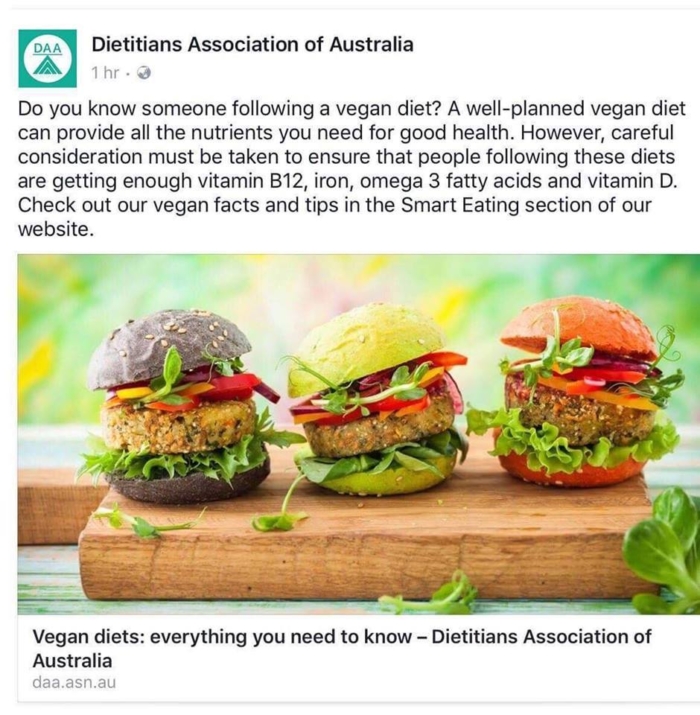
In fact, Vegan diets strictly omit entire food groups including all animal products (meat, fish, eggs) and dairy (cheese, butter, milk). Foods that contain essential vitamins including Vitamin B12, Vitamin D and minerals; iron, calcium and zinc.
Not eating animal protein and fats can seriously compromise health outcomes without professional guidance and supplementation.
Vegan vs Low Carb. Why did the DAA choose one over the other? This stirred up much conversation on Facebook. Take a look here.
Feng-Yuan Liu, an Accredited Practising Dietitian responded to a piece written by the Dietitians Association of Australia (DAA) about Low Carbohydrate High Fat principles and Type 2 Diabetes, published under the DAA's “Hot Topics” in January 2016. You could access the DAA's full article here, but it has since been removed. I highly recommend reading Yuan's response, an articulate, science based article, published in January 2017.
Diet Doctor, Andreas Eenfeldt gives an idea of some of the 'dangerous' foods typically included in a Low Carb diet below.
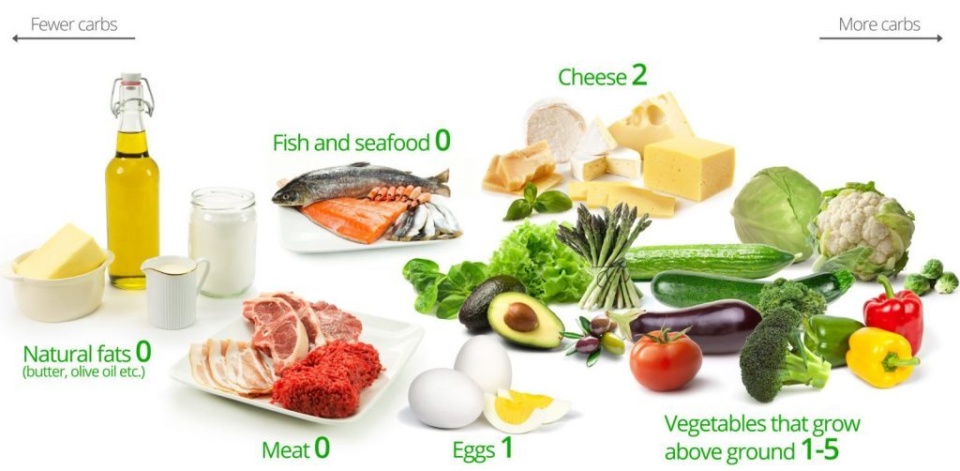
Vested Interests and Ideology are shaping our dietary and health guidelines
Now that we have the science behind Low Carb Healthy Saturated Fat sorted, I find it even more fascinating that ALL the references used on the DAA Vegetarian Position statements (published in 2014 & updated 2017) are from Seventh-day Adventists and/or employees of Kellogg's, a breakfast cereal company founded by Seventh-day Adventists;- Dr John Harvey Kellogg and his younger brother William Keith, back in 1894.
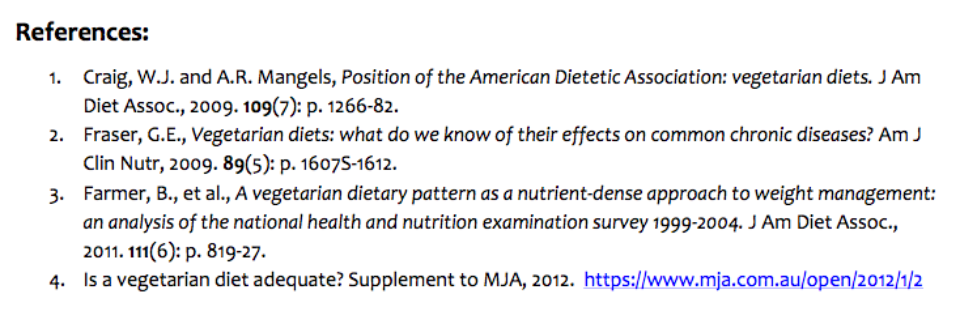
Half the references quoted are from Seventh-day Adventists. The first 3 references are identical on each paper but the 4th reference; The Medical Journal of Australia 'Vegetarian Supplement' published 2012, has been removed from the 2017 version.
I wonder if this is a deliberate omission after I shared a blog-post questioning the Vegetarian Supplement in the Medical Journal of Australia because it was sponsored by Sanitarium Health and Wellbeing, a processed breakfast cereal company in Australia wholly owned by the Seventh-day Adventist Church.
I also discovered that most of the authors of the MJA Supplement were Seventh-day Adventists and/or were working for Sanitarium or the Sydney Adventist Hospital at the time of publication.
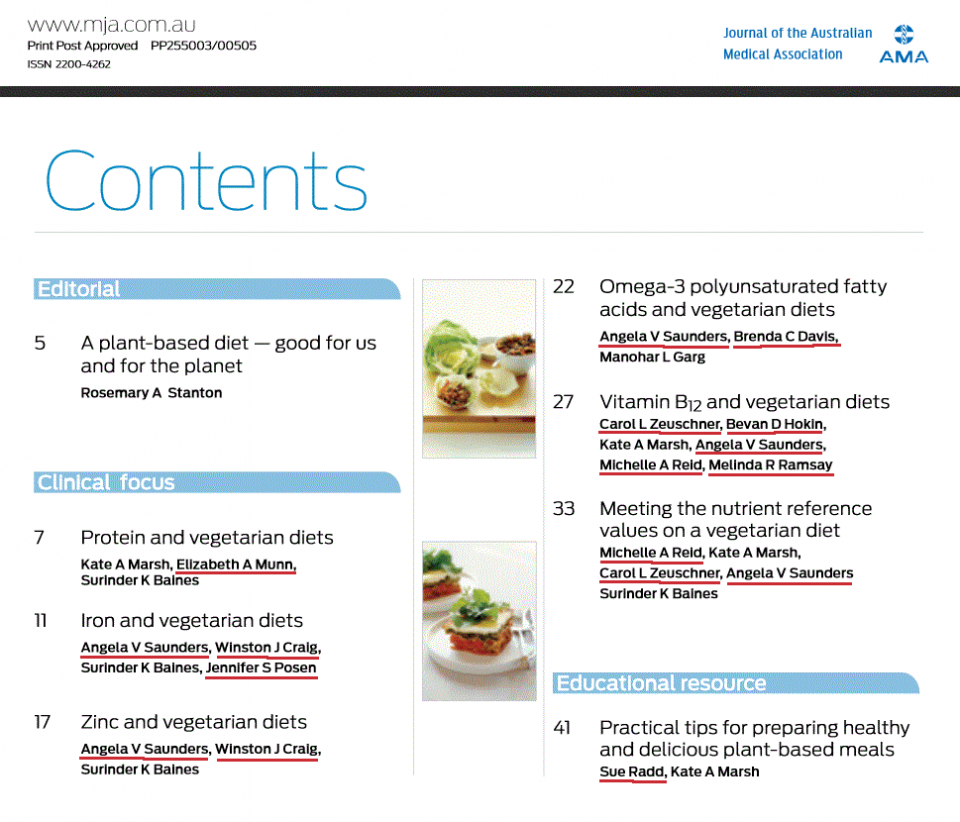
Reference 4: Medical Journal of Australia 'supplement'
The Royal Australian College of General Practitioners (RACGP) Supplement is designed to encourage GP's to feel confident prescribing vegetarian/vegan diets. Authors include;-
Elizabeth Munn - Consultant dietitian at Sanitarium Health & Wellbeing, Consultant dietitian at Nuts for Life.
Angela Saunders - Senior Dietitian Science and Advocacy, Corporate Nutrition at Sanitarium Health and Wellbeing Previous - Sydney Adventist Hospital.
Carol Zeuschner - Nutrition and Dietetics Manager, Sydney Adventist Hospital. She has also co-authored a chapter in the book The Impact of Meat Consumption on Health and Environmental Sustainability, titled the Red Meat and Health: Evidence Regarding Red Meat, Health, and Chronic Disease Risk with Angela Saunders and Kate Marsh (Vegan)
Bevan D Hokin - Director of Pathology at Sydney Adventist Hospital
Michelle A Reid - Senior Dietitian at Sanitarium Health & Wellbeing Company
Melinda R Ramsay - Project Coordinator - Sanctuary Sanitarium (Adventist)
Sue Radd - Seventh-day Adventist Sydney-based dietitian
Brenda C Davis - Lead dietitian in diabetes research project in Majuro, Marshall Islands Ministry of Health with Loma Linda (Seventh-day Adventist University)
The Disclosure; Go Grains Health and Nutrition, Nuts for Life and Sanitarium Health and Wellbeing (maker of breakfast cereals, soy and fake meat analogues) were acknowledged for sponsoring the articles on Vegetarian/Vegan diets in the MJA Supplement, but there was no acknowledgement of religious ideology which could heavily influence the pro cereal/grains and anti low carb messaging.
Nor am I aware of any acknowledgement of the Adventist Health Ministries sponsoring the papers.
Vegan vs Low Carb. Why the DAA supports one and not the other ...
The DAA Vegetarian Position Paper was developed by members of the Vegetarian Interest Group for Accredited Practising Dietitians and practising in the area of Vegetarian Nutrition according to the document.
I would hope that the authors and reviewers had extensive knowledge of this topic but I find it concerning that all the references include people with religious ideology based on the teachings of the Seventh-day Adventist Church and/or those from the Food Industry - namely, Sanitarium and Kellogg's.
References:
1. Craig, W.J (Seventh-day Adventist). and A.R. Mangels (Vegan for ethical reasons), Position of the American Dietetic Association: vegetarian diets. J Am Diet Assoc., 2009. 109(7): p. 1266-82.
2. Fraser, G.E (Seventh-day Adventist), Vegetarian diets: what do we know of their effects on common chronic diseases? Am J Clin Nutr, 2009. 89(5): p. 1607S-1612.
3. Farmer, B., et al., (3 of the authors closely tied to Kellogg's) A vegetarian dietary pattern as a nutrient-dense approach to weight management: an analysis of the national health and nutrition examination survey 1999-2004. J Am Diet Assoc., 2011. 111(6): p. 819-27.
4. Is a vegetarian diet adequate? Supplement to MJA (Mostly Seventh-day Adventists and employees of Sanitarium/Sydney Adventist Hospital, as shared above) published 2012.
Reference 1: Winston Craig, PhD, MPH, RD (Adventist)
"Dr. Winston Craig is Professor of Nutrition at Andrews University (the Flagship of Seventh-day Adventist education based in Michigan). He has taught health and nutrition at Andrews since 1987 and was chair of the department for 20 years. He is a registered dietitian and holds membership in the American Society for Nutrition and the Academy of Nutrition and Dietetics. Dr Craig has authored 300 articles for health publications, 7 chapters for various nutrition books, and 2 dozen articles for scholarly journals including the position paper of the Academy on Vegetarian Diets. He has written 8 books on nutrition and health. His research interests include the role of a plant-based diet in preventing chronic diseases, and the disease preventing properties of spices and herbs." Adventist Health Ministries
Reference 2: Gary Fraser, MBChB, PhD, MPH
"Dr. Gary Fraser, Professor of Epidemiology at Seventh-day Adventist Loma Linda university, is the Principle Investigator of the Adventist Health Study 2 (AHS2). This is a prospective study of 100,000 subjects looking at health outcomes of various diets and lifestyle, including the impact of religion and well-being. Dr. Fraser is a cardiologist and epidemiologist as well as being a professor of medicine at Loma Linda University. He has researched and published extensively on diet, longevity and chronic disease and will be presenting the latest findings of AHS2 in the context of NCDs." Adventist Health Ministries
Reference 3: Bonnie Farmer (and Kellogg's!)
Bonnie Farmer, MS, RD - principal member, PlantWise Nutrition Consulting, LLC, Plainwell, MI; at the time of the study, she was a graduate student, School of Health Sciences, Eastern Michigan University, Ypsilanti, MI. Bonnie Farmer has since worked for Kellogg's in various capacities from 2005 - present as acknowledged on her LinkedIn account.
Brian T. Larson, PhD - vice president, research and development, JG Consulting Services, LLC, Dowling, MI. At the time of the study, he was a senior nutrition scientist, Kellogg Company, Battle Creek, MI.
Dr. Victor L. Fulgoni, III, PhD - senior vice president, Nutrition Impact, LLC, Battle Creek, MI. He made no Disclosure about being Vice-President for Food and Nutrition Research at Kellogg's from 1983 until 1999.
Dr Fulgoni's company, Nutrition Impact, LLC is described as "a small consulting firm that specializes in helping food & beverage companies develop and communicate aggressive, science-based claims about their products and services." Nutrition Impact, LLC helps companies market their food products by promising drug-like benefits. Foods that are marketed with health claims are referred to as nutraceuticals or functional foods. He also consults to Dietfit, a weightloss program in the US.
Dr. Fulgoni's research project 'Ten-Year Trends in Fiber and Whole Grain Intakes and Food Sources for the United States Population: National Health and Nutrition Examination Survey 2001–2010' was published in Nutrients 2015 with Coca-Cola's Senior Nutrition Manager Latha Devareddy.
Alice J. Rainville, PhD, RD - professor of nutrition and dietetics, Eastern Michigan University, Ypsilanti. No COI disclosed
George U. Liepa, PhD - professor of nutrition and dietetics, Eastern Michigan University, Ypsilanti. No COI disclosed
David Gillespie and Fad Diets
David Gillespie, author of Sweet Poison said back in January 2017 "If food group deletion is the reason for (the DAA's) official opposition to paleo, gluten free and quitting sugar, why are they happy to give a free pass to vegetarianism and its more extreme cousin, veganism? Both these diets cut out food groups and require careful management in order to avoid significant nutrient deficiencies. But these diets are rarely attacked by dietitians!'
"So the next time you hear a dietitian banging on about 'fad diets' remember two things. Firstly, sugar is not a food group and you may safely remove it, forever. Secondly, the biggest offender on the 'delete whole food group' front is the one they dare not mention -vegetarianism/veganism."
Why are the DAA so protective of 'Plant-Based' Ideology? Could it be their Corporate Partnerships with the Cereal and Grain Industries? Partnerships which not only require the Dietitians Association of Australia to provide Influence and Protection of the processed food industry, but also require them and their 6,200 members to 'Actively Defend' Low Carb, Paleo and Sugars messaging?
#wheatileaks - Is the Dietitians Association of Australia Actively Defending Ideology and Corporate Partnerships by Targeting Low Carb Advocates
I am working on a full #wheatileaks expose, but in the meantime please take a look at Maryanne Demasi's brilliant article;- Cereal Offenders: how the sugar lobby wins friends and targets enemies highlighting leaked documents from the Australian Breakfast Cereal Manufacturers Forum, an arm of the Australian Food and Grocery Council, and running as #cereal4brekkie.
For some background - I unexpectedly uncovered 3 ABCMF documents while looking up a dietitian who was promoting breakfast cereal on a social media platform and bagging out Low Carb. I typed in his name with a key term I often use in Google searches and Voila! Minuted meetings from the Australian Breakfast Cereal Manufacturers Forum 2014 appeared. I alerted a couple of friends of my find and they uncovered even more. Gary has submitted 49 documents in total to the current Senate Inquiry into obesity and we have been told they will be made public shortly!
(EDIT: The Senate Inquiry into Obesity changed their terms of reference and Gary's submission became irrelevant. The documents were never made public!)
The documents detail the expectations of the DAA, and its members, in influencing, protecting and 'Actively Defending' the cereal and grains messaging by targeting advocates of Low Carb.
Gary is one of nine people, and the only medical doctor named in these documents, 'as targeted for Active Defense'!!
The DAA were paid a mere $23,000 (according to the documents) to provide influence and protection of the pro cereal / anti Low Carb messaging ... WOW.
I wonder if Accredited Practising Dietitians realise they have been 'used' by their parent body to provide KPI's to appease corporate partners so they "continue to add value", as noted in the leaked documents:
*Provides/briefs spokespeople
*Facilitates reach to dietitian media influencers
*Monitoring and liaison re anti-sugar and anti-carbohydrate advocates
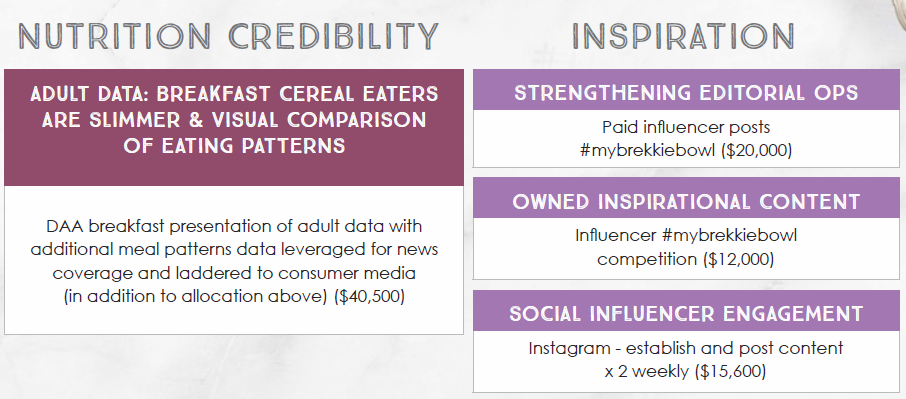
The documents also list the Grains and Legumes Council (GLNC) and the Dietitians Association of Australia as 'Actively Defending' grain foods.
It was documented that the "GLNC is in the process of developing plans around the ‘Paleo Way’ push and has defended against low carbohydrate diets previously."
Some media/social media dietitians are defending grain foods, supporting the dietary guidelines and DAA, and publicly responding to Peter Evans. However, a few dietitians are supporting low carbohydrate diets/paleo or aspects. APDs providing inappropriate advice risk formal complaints and penalties.
More concerning is the comment that the "DAA has been active providing evidence-based information on paleo diets and low carbohydrate diets and defending the dietary guidelines."
"Some media/social media dietitians are defending grain foods, supporting the dietary guidelines and DAA, and publicly responding to Peter Evans. However, a few dietitians are supporting low carbohydrate diets/paleo or aspects. APDs providing inappropriate advice risk formal complaints and penalties."
Is this what happened to Jen Elliott? Is this why she was deregistered? Because the DAA was being pressured to penalise Low Carb Advocates like Gary, along with Maryanne Demasi, who were named for 'Active Defense' in the leaked documents?
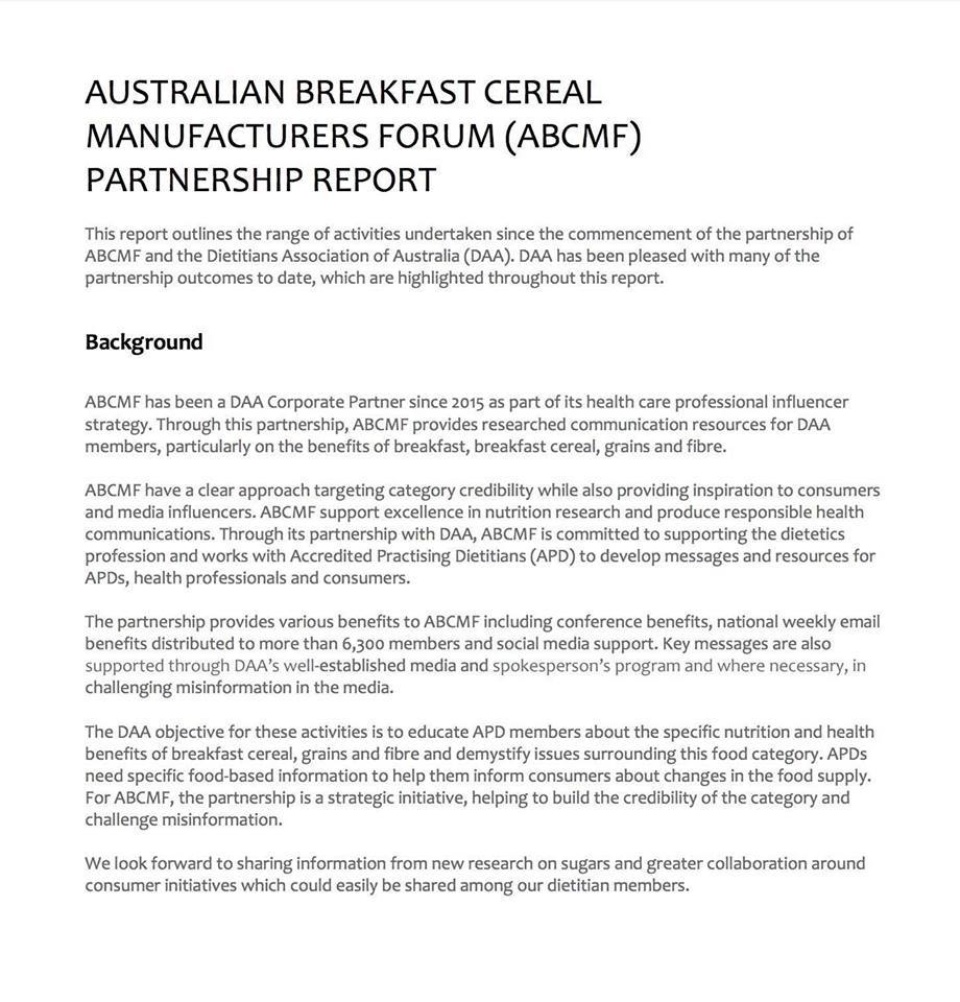
Are dietitians aware that their parent body, the Dietitians Association of Australia, puts a stamp of approval on vegetarianism and veganism which has been shaped by Religious Ideology and their corporate partnerships with Vested Interests, yet refuses to consider the health benefits of Low Carbohydrate Healthy Fat principles?
It is basic biochemistry - carbohydrates turn to glucose as soon as they are ingested. The myth that we need 130g of carbohydrates for our brain to function simply isn't true and nor is the myth that saturated animal fats cause heart disease.
If you are interested in the history of our dietary guidelines please continue reading. There is just so much to share. I have attempted to summarize the information as briefly as I could. Special acknowledgement to Rhys Southan. His research into the American Dietetics Association is incredible. He was unaware of Lenna Cooper, a protege of Dr John Harvey Kellogg and a member of the Seventh-day Adventist Church, founding the American Dietetics Association back in 1917 and amazed their influence went back so far. His work on the Seventh-day Adventist influence on American Vegetarian Position Papers is incredible.
Vegan ideology comes from Seventh-day Adventist Church
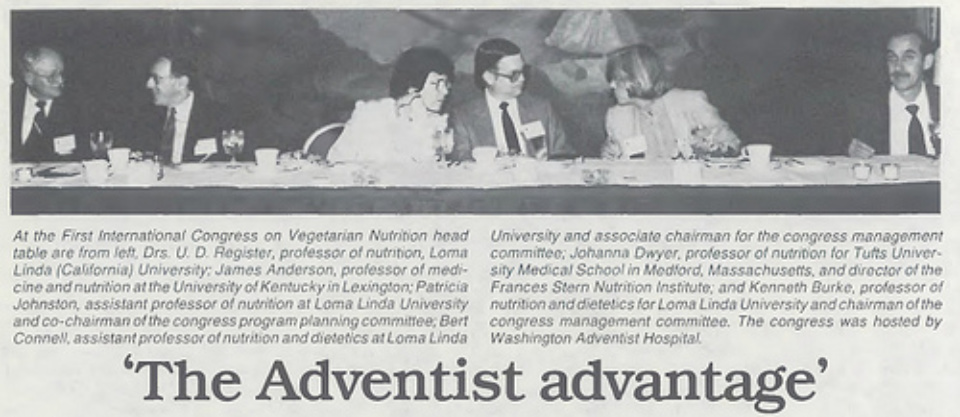
I discovered the Seventh-day Adventist Dietitians' involvement in writing the first American Dietetic Association Vegetarian Position paper over 4 years ago, thanks to Rhys Southan and the extensively referenced research he has done on this topic kindly shared on his website Let Them Eat Meat.
Excerpts from Rhys' website include;-
"The Seventh-day Adventist Dietetic Association formed in 1954. The number one stated objective for the organization was, "To uphold by precept and example the principles of healthful living given to the denomination by the Spirit of Prophecy.” (“S.D.A. Dietetic Association Organized,” Paul S. Damazo, Atlantic Union Gleaner, Dec. 20, 1954, p.2)
"Until we can teach them how to prepare health reform foods that are palatable, nourishing, and yet inexpensive, we are not at liberty to present the most advanced propositions regarding health reform diet. Let the diet reform be progressive. Let the people be taught how to prepare food without the use of milk or butter. Tell them that the time will soon come when there will be no safety in using eggs, milk, cream, or butter, because disease in animals is increasing in proportion to the increase of wickedness among men… . God will give His people ability and tact to prepare wholesome food without these things."—[Ellen G.White's) Testimonies, vol 7, pp. 132-135."
"In defense of conducting nutritional research, Adventist doctor, Harry W Miller is quoted as saying;-
"From the preceding it is perfectly clear that some foods now used must be discarded from the diet, that through research substitutes will be found for them, and that food plants in many places will be built for providing the same. …"
"We can always be sure that thorough scientific research will support and not contradict Inspiration;-
"To research workers it is of the greatest encouragement to embark upon problems that Inspiration has foretold would be accomplished. The assurance that the Lord will give wisdom to those who study to find suitable substitutes for meat, eggs, and milk in the diet is a great stimulus."
— “The New Nutrition Research Laboratory” by Harry W. Miller, Review and Herald, Aug. 20, 1953, p. 18
The American Dietetic Association Vegetarian Position Papers from 1980 have been Influenced by Adventist Ideology
Rhys Southan
1980: “Position Paper on the Vegetarian Approach to Eating”
Contributors: Lydia Sonnenberg (vegetarian Seventh-day Adventist), most likely Kathleen Keen Zolber (vegetarian Seventh-day Adventist) and U.D. Register (vegetarian Seventh-day Adventist)
Position statement: “The American Dietetic Association affirms that a well planned diet, consisting of a variety of largely unrefined plant foods supplemented with some milk and eggs (lacto-ovo vegetarian diet) meets all known nutrient needs. Furthermore, a total plant dietary can be made adequate by careful planning, giving proper attention to specific nutrients which may be in a less available form or in lower concentration or absent in plant foods.”
In 1980, The American Dietetic Association published “Position Paper on the Vegetarian Approach to Eating.” However ... the ADA’s true position on a well-planned vegetarian diet arrived seven years later, just before the second vegetarian position paper was published in 1988:
American Dietetic Association (ADA) position adopted by the House of Delegates Leadership Team on October 18, 1987, and reaffirmed on September 12, 1992; September 6, 1996; June 22, 2000; and June 11, 2006.
"The 1980 paper was mostly positive about vegetarianism and even veganism, but more importantly it provided important groundwork for the later ADA vegetarian position papers."
By the 1988 version the Vegetarian Times wrote "In the last two decades, the American Dietetic Association’s position on vegetarianism has changed from skepticism to cautious acceptance to something approaching advocacy - or at least a recommendation that Americans move away from the standard meat-centered diet to a more vegetarian one."
Of the nine authors and reviewers of the ADA’s 1988 vegetarian position paper, six took part in Loma Linda University’s First International Congress on Vegetarian Nutrition in 1987: Johanna Dwyer, Kathleen Keen Zolber, U.D. Register, Patricia Mutch, Alice Marsh and Phyllis Acosta.
Loma Linda is a Seventh-day Adventist university, which may be why the Congress was heavily focused on Adventist themes. An Adventist writer summed up the First International Congress on Vegetarian Nutrition a few months later:
At the congress no one disputed that Seventh-day Adventists have longer life expectancies than the general population. … While many researchers identified vegetarianism as the reason, others suggested that in addition, the Adventist lifestyle might account for the longer life expectancies. …
The goal of the convention organizers was to share with other professionals scientific and research support for the Seventh-day Adventist health principles—something they accomplished very satisfactorily.
Co-sponsors included: Loma Linda University Medical Center, Adventist Health System/United States, Seventh-day Adventist Hospital Associations, San Joaquin Community [Adventist] Health Center, Loma Linda University, Andrews University, Departments of Health of the North American and South Pacific Divisions of Seventh-day Adventists, Seventh-day Adventist Dietetic Association. Corporate donors included: S.E. Rykoff/Sexton, Worthington Foods, Inc., Loma Linda Foods, Sanitarium Foods.
As you can see, Religious Ideology, and the deep belief that 'grains are good' and 'meat is bad' is as powerful, if not more so, than any Food and Pharmaceutical Industry influence on our dietary and health guidelines!
Consider for a moment the combined lobbying power of Adventist Ideology, the Food Industry (especially cereal, grains and soy producers) with the Vegan Movement.
But first ... a little explanation as to where the Western version of Vegetarianism/Veganism has come from and why this needs to be considered as a powerful influence on our dietary and health guidelines.
The Seventh-day Adventist Ideology Influences our Dietary and Health Guidelines
It is a long story but in summary, the Seventh-day Adventist Church are medical evangelists for the 1863 'vegetarian' Health Reform visions of their Prophetess, Ellen G White. Adventists generally abstain from 'Flesh Foods' and consider fruits, grains, nuts and vegetables the God-Given diet of man. Their vegetarian diet is technically vegan, but the word didn't become part of the English language until Donald Watson coined the term 'vegan' in 1944.
In the early 1890's Dr John Harvey Kellogg was experimenting with wheat and corn at the Battle Creek Sanitarium where he worked, attempting to create cereal as an alternative to the meat heavy breakfasts most Americans ate at the time. The Adventist Church believed a diet centered on bland foods, like cereal, would lead improve the health of Americans and help guide them away from their sinful lives. In fact, "One very specific sin: masturbation." writes Matt Soniak in his online article here.
Matt continues citing Kellogg's own writings “If illicit commerce of the sexes is a heinous sin, self-pollution is a crime doubly abominable.” Incredibly, in his book Plain Facts for Old and Young Embracing the Natural History and Hygiene of Organic Life, Kellogg cataloged 39 different symptoms of a person plagued by masturbation, including general infirmity, defective development, mood swings, fickleness, bashfulness, boldness, bad posture, stiff joints, fondness for spicy foods, acne, palpitations, and epilepsy.
Kellogg’s supposed solution to all this suffering was a 'healthy', bland diet and an impeccably clean bowel. In other words, a 'Plant-Based' diet of cereal, grains, fruits and vegetables with plenty of fibre. And if that didn't keep the bowel nice and clean, yoghurt enema's and water cures were instigated!
At this point, it's important to understand that John Harvey Kellogg was only 12 years of age when he was taken under the wing of the 'First Family' of Adventists, and began typesetting the early publications of Prophetess, Ellen G White. He typeset the book An Appeal to Mothers, recounting her Health Reform visions from June, 1863, which "depicted the perils of secret vice". The book was reprinted by Ellen's husband, James White, in 1870 and renamed A Solemn Appeal Relative to Solitary Vice and the Abuses and Excesses of the Marriage Relation.
Is it any wonder John Harvey Kellogg had such strange and extreme ideas on Biologic Living, masturbation and circumcision, and that he developed an aversion to sex, never actually consummating his own marriage?
Vegetarian Position Papers from the American Dietetic Association (now called the Academy of Nutrition and Dietetics - AND) thanks to Rhys Southan
"Ann Reed Mangels, PhD,RD, LDN, FADA (The Vegetarian Resource Group, Baltimore, MD).” "I was surprised that a prominent vegan activist had worked on the 2009 Vegetarian Position Paper paper, even if she was a dietitian." Rhys Southan
"Reed Mangels and Suzanne Havala (primary author for the 1988 and 1993 papers, reviewer for the 1997 paper and content advisor for the 2003 paper) couldn’t resist doing the same in 2010:
Reviews by professional organizations such as the American Dietetic Association have concluded that a well-planned vegetarian diet can be nutritionally adequate and provide health benefits. Adding recommendations in the guidelines that will address the nutritional needs of these vegetarians and vegans would strengthen the [USDA’s] Dietary Guidelines.
– “The Vegetarian Resource Group gave oral and longer written testimony concerning revisions for the 2010 Dietary Guidelines,” Reed Mangels and Suzanne Havala, Vegetarian Journal, Vol. 28, Issue Three, 2009, p. 21
"In an email, reader Ben F. pointed out that Mangels did it again when she went solo with The Everything Pregnancy Book (2011):
Whether you’ve been vegan for many years, are a relative newcomer to veganism, or are simply contemplating being vegan, adding pregnancy to the equation may raise questions. Rest assured, the American Dietetic Association (ADA) has said that well-planned vegan diets are "appropriate or all stage of the life cycle including pregnancy and lactation.” (p. 1) …
Health Benefits
According to the American Dietetic Association’s 2009 position paper on vegetarian diets, “appropriately planned vegetarian diets, including total vegetarian or vegan diets, are healthful, nutritionally adequate, and may provide health benefits in the prevention and treatment of certain diseases.” There are significant health advantages associated with both vegan and other types of vegetarian diets. (p. 8)
"It strikes me as misleading for the authors of these papers to later reference the papers as if they had nothing to do with them, in order to give more strength to their defense of the nutritional adequacy and possible benefits of vegetarianism and veganism."
Low Carb Healthy Fat diets are possible
Stewart McLean, Admin for the Facebook Group In Support of Paleo and Low Carb Living, wrote a clever little scenario which I just have to share;-
Me: I might give up sugar
Public Health: No, don’t do that!
Me: Why not?
Public Health: Cutting out sugar from your diet is a fad
Me: I might give up dairy
Public Health: No, don’t do that!
Me: Why not?
Public Health: Cutting out dairy from your diet is a fad
Me: I might give up grains
Public Health: No, don’t do that!
Me: Why not?
Public Health: Cutting out grains from your diet is a fad
Me: I might go vegan
Public Health: Sure, that’s fine
It was the introduction to David Gillespie's article If Quitting Sugar is a Fad, so is going Vego!
It is up to each of us to choose health and how that applies to our own health and beliefs, not Association's with ties to Corporate Sponsorships and undeclared ideology. If the Australia Dietitians Association truly are the peak body providing the science of nutrition why can't they safely support people no matter what the dietary requirements are?
Low Carb Healthy Fat principles are simple and sustainable for those that choose them.
Denise Minger, an ex-Vegan, has some great advice for those who choose to be Vegan and stay as healthy as possible.
The team at Virta Health also offer support and resources for people who have health issues that stop them from eating animal products or choose to eat a vegetarian/vegan diet.
Conclusion
In conclusion, it isn't up to Vested Interests and ideology to shape our dietary and health guidelines. Guidelines which have become strict Rule-Books pushing a pro cereals/grain message and anti low carb/red meat and saturated animal fats.
Targeting advocates of Low Carb simply because Corporate Sponsorships are pressuring Associations that provide nutrition advice is just so wrong! I won't stop calling this out.
Where is the science??
Breaking news!
OMG ... The Dietitians Association of Australia announced yesterday that all ties to the food industry will be severed from December 2018. Gary and I couldn't believe it. Especially coming on the back of the AHPRA notification last Thursday stating that ALL trumped up charges against Gary have been dropped. Not only that but Gary received a written apology. How much better can this week get?
Let's work out how to fix the broken system! I share some ideas here :-)
#watchthisspace
(EDIT: Unfortunately the good news about the DAA severing sponsorship's with industry became advertising opportunities instead. Nothing much has changed after all... )
Please #benoisywithme
